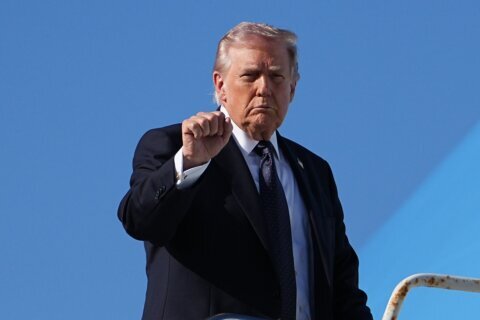Visit WTOP’s Election 2024 page for our comprehensive coverage. Listen live to 103.5 FM for the latest. Sign up for WTOP’s Election Desk newsletter for headlines and analysis from now until Inauguration Day.
Congress returns Monday and will only have a few weeks to avoid a government shutdown — which could be complicated by legislation related to federal elections.
 Members of the House and Senate have been back in their districts for much of the summer, campaigning ahead of the November election. But when lawmakers come back into session next week, they’ll face a Sept. 30 deadline to pass a short-term spending bill to keep the government up and running.
Members of the House and Senate have been back in their districts for much of the summer, campaigning ahead of the November election. But when lawmakers come back into session next week, they’ll face a Sept. 30 deadline to pass a short-term spending bill to keep the government up and running.
House Speaker Mike Johnson has indicated he intends to bring up a measure that would extend government funding into March 2025 and include the Safeguard American Voter Eligibility (SAVE) Act — the GOP-backed bill that would require individuals to prove U.S. citizenship to register to vote in federal elections.
Democrats say the legislation is unnecessary, since it is already illegal for noncitizens to vote in federal elections. But Johnson has been getting pressure from former President Donald Trump and other conservatives to bring up the legislation.
If the spending measure were to pass the House — which remains a big question — Senate Democrats say it would be dead on arrival in the upper chamber.
President Joe Biden has also said he opposes the SAVE Act, which passed in the House as a standalone bill earlier this year.
While some states and localities allow noncitizens to vote in some elections, it is a felony for a noncitizen to vote in a federal election.
“Every state ought to be very clear that we’re going to force that only citizens are voting in our state, local and federal elections,” said Rep. Chip Roy, R-TX, the sponsor of the legislation, on Steve Bannon’s “War Room” podcast.
“But the SAVE Act is meant to layer on top of that, to say that no matter what you want to do at the state and local level, only citizens are going to vote for our Congress, Senate and President,” he added.
Given that Election Day is on Nov. 5, there is little desire among most members of both parties to allow funding to lapse at the end of this month, causing a government shutdown only weeks before voters go to the polls.
But the two parties will need to reach some type of agreement on a continuing resolution (CR), since work on the overall budget is far from complete.
It remains unclear how long the CR would be.
Many Republicans want it to extend into next year in the hope that Trump will be back in the White House and they can implement a GOP agenda.
If a shorter CR is agreed to, it would likely extend into later this year, and final approval of a budget would take place in the lame-duck session after the election.








